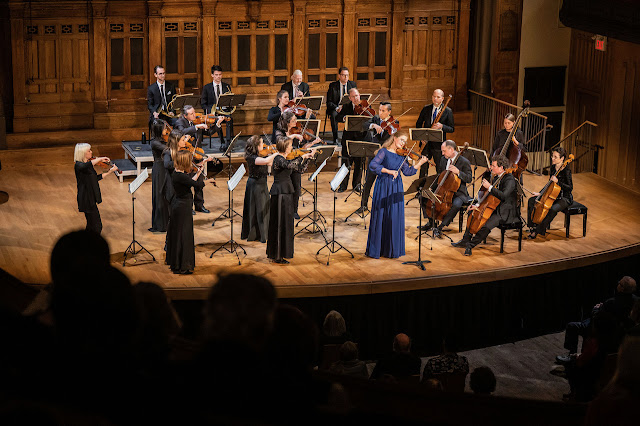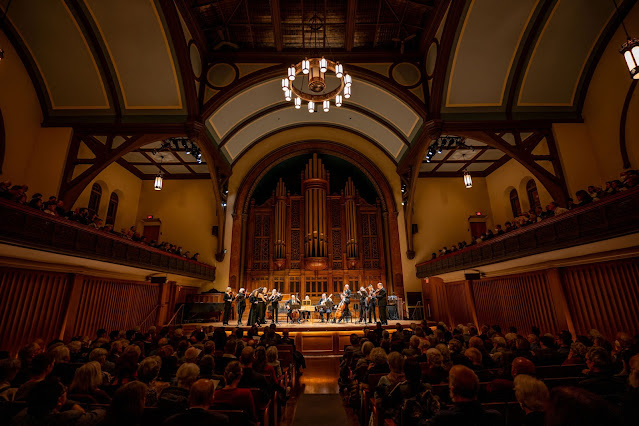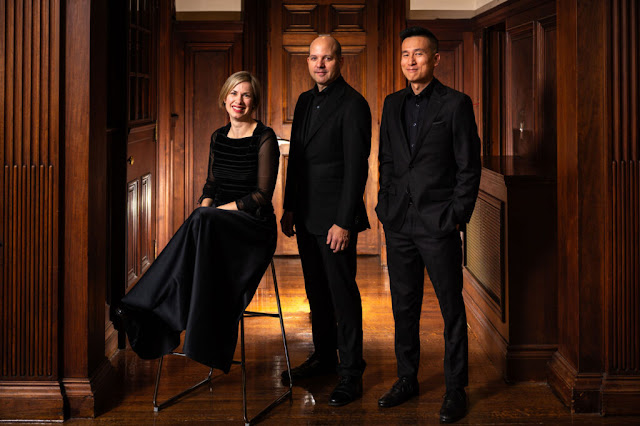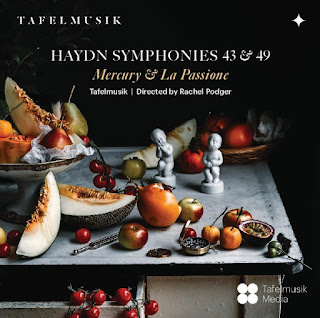 |
| Tafelmusik & Rachel Podger (Photo: Dahlia Katz) |
Tafelmusik, the Canadian period instrument ensemble, recently appointed violinist Rachel Podger as principal guest director and this month the orchestra released a disc of Haydn symphonies with Rachel Podger as director, on the ensemble’s own label. Tafelmusik is led by the artistic triumvirate, all three players in the ensemble, Brandon Chui (viola), Christina Zacharias (violin) and Dominic Teresi (bassoon) and I recently chatted to Brandon to find out more about the new disc and Tafelmusik’s collaboration with Rachel Podger.
The new disc features two of Haydn’s symphonies, No. 43 in E-flat Major “Mercury” and No. 49 in F minor “La Passione”, both recorded live from concerts at Toronto’s Jeanne Lamon Hall in 2023 led from the violin by Rachel Podger. The ensemble was not, originally, planning on issuing a recording. But they have a digital stream, issuing three programmes per season. The plan was for Rachel Podger to come and direct a programme of Hadyn and Mozart which would be performed in Toronto and recorded for video. The initial concept of the two Haydn symphonies and a Mozart violin concerto was one that Rachel Podger and co-artistic director Dominic Teresi initially came up with. They filmed the concert, as planned, but the results were, in Brandon’s words, ‘so damn good’ that it was decided to issue the recording on the ensemble’s own label.
Brandon explains that many of the ensemble’s recordings are made live, including their set of the complete Beethoven symphonies conducted by Bruno Weil and their recording of Handel’s Messiah. Whether or not a recording is made live is to a certain extent dependent on financing, but also there is the desire to capture the effect of playing for a live audience. Brandon explained that, though it can sound cliched, when Tafelmusik is on stage, they find an extra gear for the audience, collectively taking a level of risk which can sound special.
Rachel Podger took up her role as principal guest director in September this year, and Brandon says she is such a ray of sunshine, leading with a love that inspires. They found it so easy to perform Haydn with Podger without a conductor. They recently performed Mozart’s Jupiter Symphony with her and it was such a joy. She loves the music and there is a great spirit of collaboration; with the ensemble, everyone has an input and Rachel Podger welcomes this approach.
When a conductor is present, Brandon feels that it is so easy simply to go along with them, yet you know that those on stage are really the ones responsible for creating the sound. The players of Tafelmusik are reactive to one another, it is their natural instinct as musicians and sometimes the conductor can get in the way. Though the orchestra has played with many fine conductors, without one, Brandon sees that they are unleased, they play with each other and react to each other. As the 19th century progresses, though, it gets harder to perform the music without a conductor, but Brandon does mention a French group that performs Stravinsky’s Rite of Spring without a conductor.
 |
| Tafelmusik in Jeanne Lamon Hall (Photo: Dahlia Katz) |
Whilst the music of the Baroque is Tafelmusik’s core repertoire, they perform at least one Classical programme per season, often including the music of Mozart and Haydn. The 2024/25 season concludes with a programme of opera arias and orchestral sinfonias by Mozart, Bologne, Salieri, Haydn and Gluck directed by Julia Wedman with soprano soloist Samuel Mariño. They have Beethoven scheduled for the 2025/26 season. Generally, Beethoven is as late as they go, though they have recorded Mendelssohn and did perform Tchaikovsky’s Serenade. Programmes tend to concentrate on one particular era, rather than moving between eras. The biggest challenge, for Brandon, when moving between music of different eras is to calibrate your ears to the new pitch. When moving from, say Handel to Mozart, the pitch changes, the strings have to tune up or down and the wind play on different instruments, it would be hard to rehearse both in the same programme. Brandon plays both Baroque and modern viola, and he feels that moving between these two is easier, as there is more separation.
The three co-artistic directors, Brandon, Christina and Dominic, each
have certain responsibilities but they regularly check in with each
other and talk almost daily as something always comes up whether it is
to do with programming, personnel, recording or more. Tafelmusik films
three programmes per season, which also creates additional work. The
three artistic directors work directly with the admin team, but
Tafelmusik is a very artist-driven organisation, their plans all centre
on what they want to do artistically.
He feels that in the
typical symphony orchestra model in North America, it is an unfortunate
reality that things are less likely driven by the artists or the music
and that it is often about where the money is coming from so that
symphony orchestras can do a lot of pop shows and movies. Tafelmusik
does not do any of this, they are always thinking about the music.
 |
| Christina Zacharias, Dominic Teresi & Brandon Chui, co-artistic directors of Tafelmusik (Photo: Dahlia Katz) |
Tafelmusic was founded in the late 1970s with Jeanne Lamon coming on board as music director in 1981. She stepped down as full-time director in 2014 after 33 years. She held the title of chief artistic advisor until 2015 and continued to perform with the ensemble in a reduced capacity until her death from lung cancer in 2021. Brandon initially worked with the ensemble as a contract player but when he joined permanently in 2018, Lamon had retired but the personnel was very steady. The roster has been very stable, their principal oboe recently retired after 20 years with the orchestra. More recently there has been a slow turnover, with a few new guard so there have been five new members (in a core membership of 17) since 2018. Artistically, the ensemble was fuelled by Jeanne Lamon as she had her stamp on everything, and they remain very artist-driven.
The challenge now is how to balance things moving forward, introducing new ideas whilst honouring Jeanne Lamon’s legacy, and when considering something new, everyone is inclined to ask, is it something that she would have approved of. It is the question of balancing tradition and innovation, they do not want to stay static but would not wish to throw anything away.
When we spoke the ensemble was about to start rehearsing a programme of Lalande, Rameau, Muffat and Élisabeth Jacquet de la Guerre with French violinist Amandine Beyer (18, 19, 20 October 2024). Then the week after the concerts they leave for a tour of Korea with Rachel Podger with a programme of Bach, Purcell, Avison and Reichenauer, giving six concerts in five cities over two weeks. This will be their first overseas tour since COVID, their first tour with Rachel Podger and their first tour since coming to the UK in 2019.
Haydn: Symphonies 43 & 49 – Tafelmusik, director Rachel Podger – Tafelmusik Media; full details from Tafelmusik’s website
The blog is free, but I’d be delighted if you were to show your appreciation by buying me a coffee.
Elsewhere on this blog
- A themed programme with an imaginative difference: Music from Pole to Pole with City of London Sinfonia and atmospheric physicist Dr Simon Clark – concert review
- Sound magic: En Couleur from the percussion group, Trio Colores – record review
- From expressionist nightmare to radiant energy: Schoenberg’s Pierrot Lunaire & Schubert’s String Quintet at Hatfield – concert review
- Charpentier’s Actéon & Rameau’s Pygmalion: a perfect double-bill offering a delightful, entertaining evening – opera review
- Intimate & communicative: Solomon’s Knot brings its distinctive approach to Monteverdi’s Vespers of 1610 at Wigmore Hall – concert review
- Waiting till they feel they have something to say: I chat to Trio Bohémo about their debut disc – interview
- On tour from New York, the Philip Glass Ensemble stopped off in Cambridge in a presentation by the Cambridge Music Festival – concert review
- Everyone clearly enjoyed themselves & brought the house down: The Sixteen in Monteverdi’s Vespers of 1610 at Temple Church – concert review
- Une messe imaginaire: Bruckner & Frank Martin from Lyon – record review
- What lies beneath: a brilliant reinvention of Judith Weir’s Blond Eckbert at the heart of ETO’s exploration of German Romanticism – opera review
- Home











